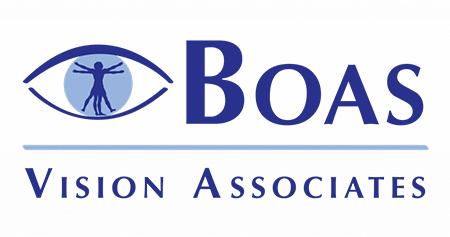WE GO BEYOND 20/20!
With over 30 years of experience providing great eye care services to patients across the Exton area, Boas Vision Associates offers comprehensive eye exams that are second to none!
Good eye care considers the whole visual system. That means checking and treating your brain, mind, and body, not just your eyeballs! We ensure that every eye exam considers the bigger picture so that we can come up with a truly holistic approach to your eye care.
Our Exton Eye Exams Test Your Total Vision
and Other Health Factors
Did you know that your eye health can tell us a lot about the overall health of your body? Just one example: eye doctors can learn about a person’s overall cardiovascular health by looking for tell-tale signs in the retina. So, while poets say that the eyes are the windows to the soul, optometrists say that the eyes are the windows to the brain and the body.
Testing for More than 20/20 Eyesight
Many people don't realize that having 20/20 vision just means that you can see a certain letter clearly on the eye chart that the average person can see from 20 feet away. There’s a lot more to healthy vision than this!
Routine eye exams at our Exton eye clinic include tests and procedures to check both how well you see, and how healthy your eyes are. These tests range from reading an eye chart to check your visual acuity, to digital imaging technology to check for signs of common eye or systemic diseases.
Eye care experts say you should have a complete eye exam every year to assess your risk for potentially damaging eye conditions and vision issues.
Our comprehensive vision exams evaluate important visual skills, like:
- Visual Acuity at Near (Clear Vision)
Is vision clear and single at close distances? Clear sight at short distances is critical to reading, writing, close work, computer use, etc. - Eye Focusing Skills
Can you see clearly at different distances? Fast, automatic eye focus adjustment is critical to learning, reading, writing, sports, etc. Problems can cause your eyes to feel tired, and make it more difficult to process what you're reading. - Eye Tracking and Eye Movement Skills
Do your eyes aim, move, and work as a team? Poor eye movement and eye tracking can cause problems including reading avoidance and/or poor reading skills, speed, concentration, and comprehension. - Convergence Eye Tests / Eye Teaming / Depth Perception / Binocular Vision Tests
Problems with your eyes working together in unison can cause problems like convergence insufficiency and poor depth perception. - Eye Movement Skills
Are your eyes moving consistently across the page when you read? Can you follow a ball as it moves across your field of vision? In the classroom, normal eye movements allow rapid and accurate shifting of the eyes along with a line of print or from book to desk to board, etc. In sports, efficient eye movements contribute to eye-hand coordination, visual reaction time, and accurate tracking. - Reversal Frequency
Is your child older than 7 and still showing confusion or reversal of letters or words (b, d; p, q; saw, was; etc.)? They may be having trouble with their visual perception. We can check whether your child's letter reversals show underlying visual perceptual processing issues.
Come visit our Exton eye clinic to see how else we can help you.

Learn More About Our Services:
Children Eye Exams
Our Exton eye care team recommends that you bring in your child for their first complete vision exam at six months old. You should then bring them in again at three years and five years old. Once they start school, you should bring them in every year for a back-to-school eye exam.
Vision Exams for Adults
Even though your vision prescription doesn't change as an adult anymore, you should still come in for an annual eye exam. This helps make sure that any eye diseases or conditions are detected and treated as early as possible.
Lazy Eye Tests (Amblyopia)
We include a "lazy eye test" for ambyopia in your infant's first eye exam. This condition affects as many as three out of every hundred children and can cause permanent visual damage if not caught and treated early.
Strabismus Eye Exams
Our eye exams include special testing for strabismus. This is because a standard eye screening or exam often does not test for problems with how both eyes work together, such as strabismus. Some types of eye turns are not easy to notice in a mirror or by other people. Our eye doctors will be able to detect strabismus even if it is subtle.
Autism Eye Tests
Those on the autism spectrum sometimes have a hard time getting through a normal comprehensive eye exam, and may not have the words to communicate vision or eye problems they're experiencing. Our doctors have a lot of experience providing specialized eye care for special needs patients, such as those on the autism spectrum, including nonverbal autism.
Nonverbal Learning Disorders (NLD)
Our eye doctors are experts at working with children and adults with Nonverbal Learning Disorders. These patients often have great eye health, 20/20 eyesight, and no problems with depth perception but may still have issues with visual processing and learning. Often, corrective lenses and/or vision therapy can help address some of these issues.
Learn more about Vision Therapy for Sensory Processing Disorders.
Vision Exams for Sensory Processing Disorders (SPD)
People with sensory processing disorders often have perfectly healthy eyes, 20/20 visual acuity, and great depth perception. Unfortunately, they also often have difficulty with visual processing, eye tracking, eye teaming, and other undetected vision problems. This can make things like reading, learning, and sports more difficult. Our eye doctors have years of experience adapting testing to match the needs of our patients.
This is a rare specialty that not many optometrists in the Exton area are able to offer.
Find out about Sensory Processing Disorder and Vision Therapy.
Concussion & Traumatic Brain Injury Eye Tests
Whether you're feeling alright or not following a concussion, you still need a comprehensive vision evaluation by a qualified optometrist. They will evaluate more deeply if there are any lasting effects on your visual system. You may not notice visual symptoms post-concussion right away. Instead, you may notice you're having trouble with things like balance, gait, coordination, reading and learning abilities, memory, life skills, etc.
Any type of concussion or other type of head injury requires an evaluation from a qualified neuro-optometric expert.
Learn about Vision Rehabilitation for Concussion and Traumatic Brain Injury.
